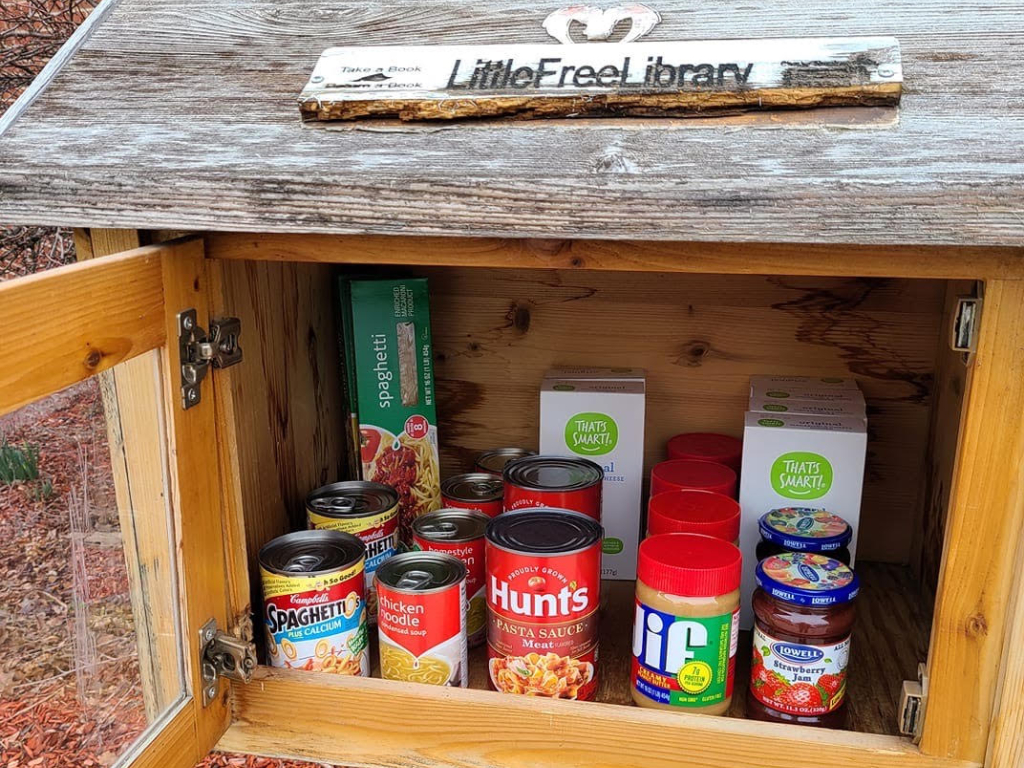Grocery stores have been hit hard during the novel coronavirus pandemic, inspiring some Good Samaritans to turn neighbourhood book-sharing libraries into miniature food pantries.

In response to the food and essentials shortages in stores, items like pasta, peanut butter, ramen and toilet paper are replacing books in those tiny honour-system libraries found in neighbourhoods across North America.
Twitter users have shared photos of the neighbourhood-run food and essentials banks, each offering different items up for grabs for those in need.
In Chicago, a free library featured cans of soup, tomatoes, almond milk and more, along with the note: “To help our neighbors affected by the COVID-19 crisis, this Little Free Library is converted into a Little Free Pantry. Take what you need and if you can, please donate what you can spare.”
Another Twitter user shared that her parents converted their library to a food shelf, too.
Milton Middle School in Milton, Wisc., also converted its official little library into a food and toiletry pantry.
Greg Metzger, executive director of Little Free Library, who spent years running a food shelf in Minneapolis, Minn., sang the praises of those making mini pantries in a Thursday blog post.

Get daily National news
“Bottom line, it is wonderful to support your neighbours. In fact, we imagine that is one of the reasons you are a steward — to help out your neighbours and community,” he wrote.
“If you want to add items of need to your library that you think would be helpful, that is completely up to you,” he continued. “We think helping one’s fellow person in this challenging time is great.”

For many, adding food items to the small libraries is a way of doing some good during troubling times.
That’s the case for Shelly Anderson, one woman who helped fill a Little Free Pantry in Woodbury, Minn.
“This is an uncertain time,” she told CNN. “I think being able to provide something to anyone is worth it.”
She approached her kids’ elementary school and asked them to convert theirs to a pantry.
“After we got approval, we went through our pantry and found all the things that would be essential — toilet paper, paper towels, some noodles and fruits,” she said. “The food is forever fluctuating. People are taking what they need and putting in, so it’s great.”
Others across the country have followed suit, sharing their own versions on Twitter.
One caveat, however, should you stumble upon a free-food pantry: always be sure that the food packaging, and food itself, is cleaned prior to consumption.
—
Questions about COVID-19? Here are some things you need to know:
Health officials caution against all international travel. Returning travellers are legally obligated to self-isolate for 14 days, beginning March 26, in case they develop symptoms and to prevent spreading the virus to others. Some provinces and territories have also implemented additional recommendations or enforcement measures to ensure those returning to the area self-isolate.
Symptoms can include fever, cough and difficulty breathing — very similar to a cold or flu. Some people can develop a more severe illness. People most at risk of this include older adults and people with severe chronic medical conditions like heart, lung or kidney disease. If you develop symptoms, contact public health authorities.
To prevent the virus from spreading, experts recommend frequent handwashing and coughing into your sleeve. They also recommend minimizing contact with others, staying home as much as possible and maintaining a distance of two metres from other people if you go out.
For full COVID-19 coverage from Global News, click here.
—





Comments
Want to discuss? Please read our Commenting Policy first.